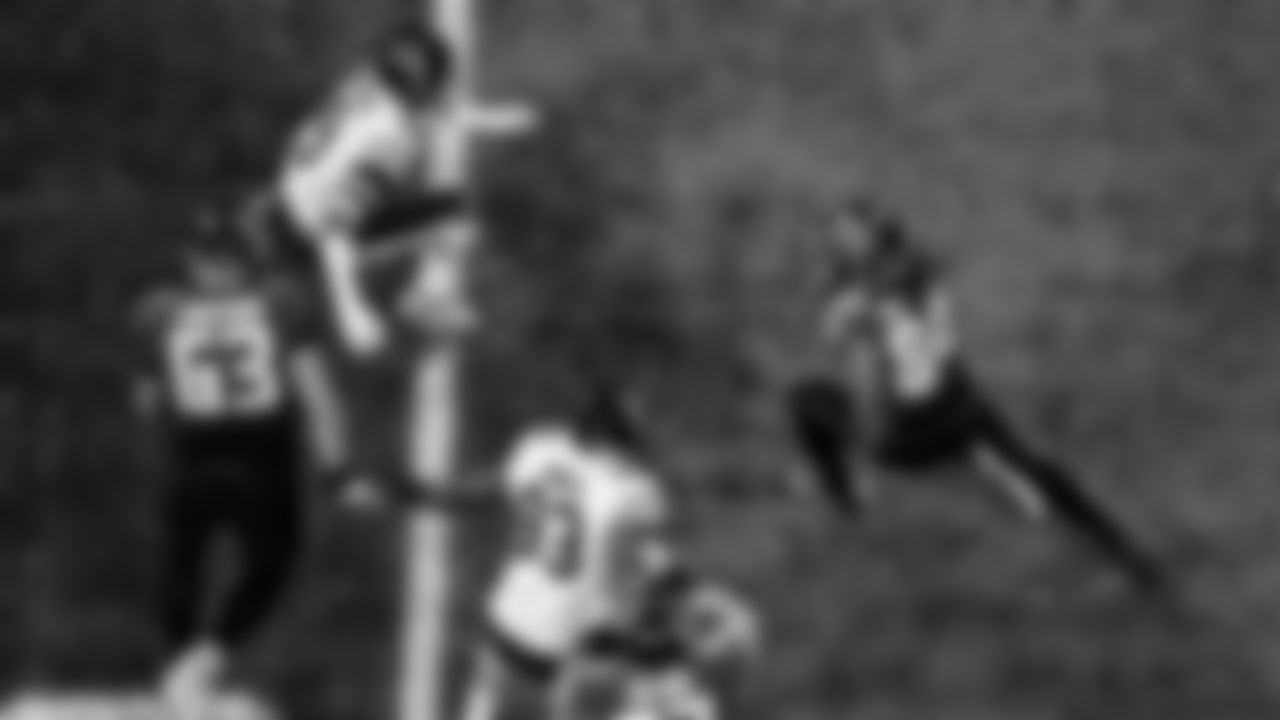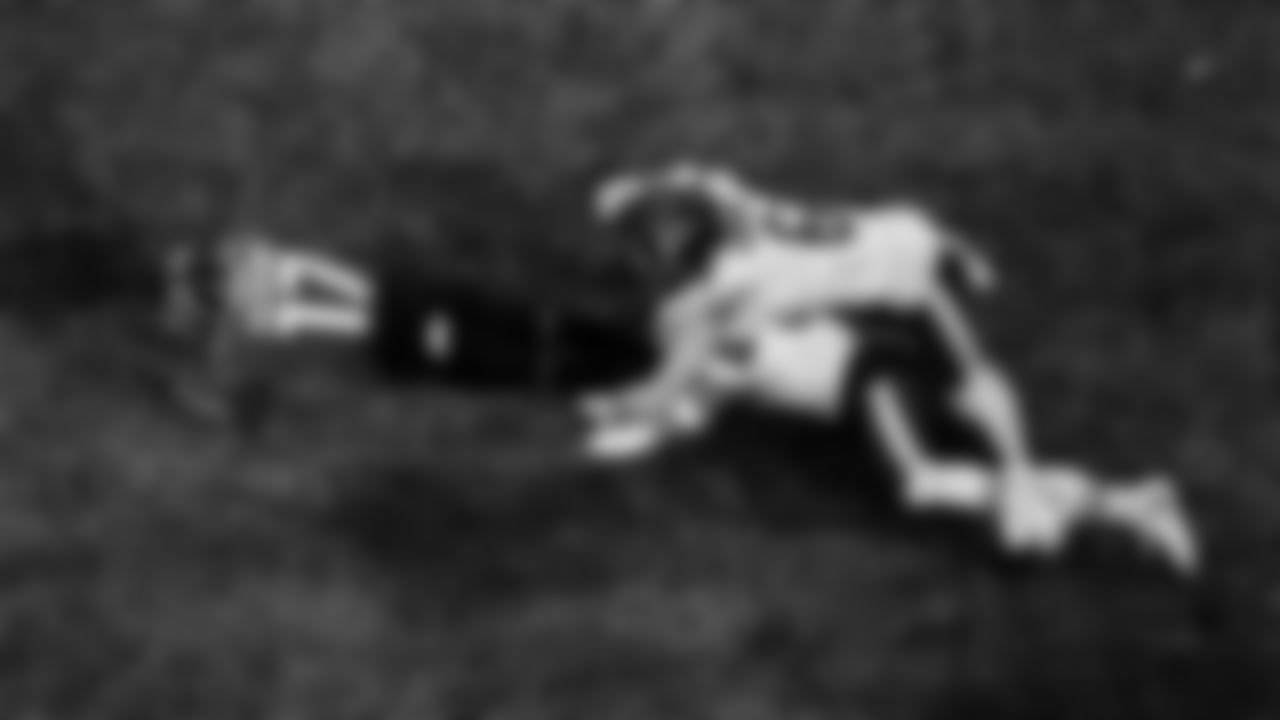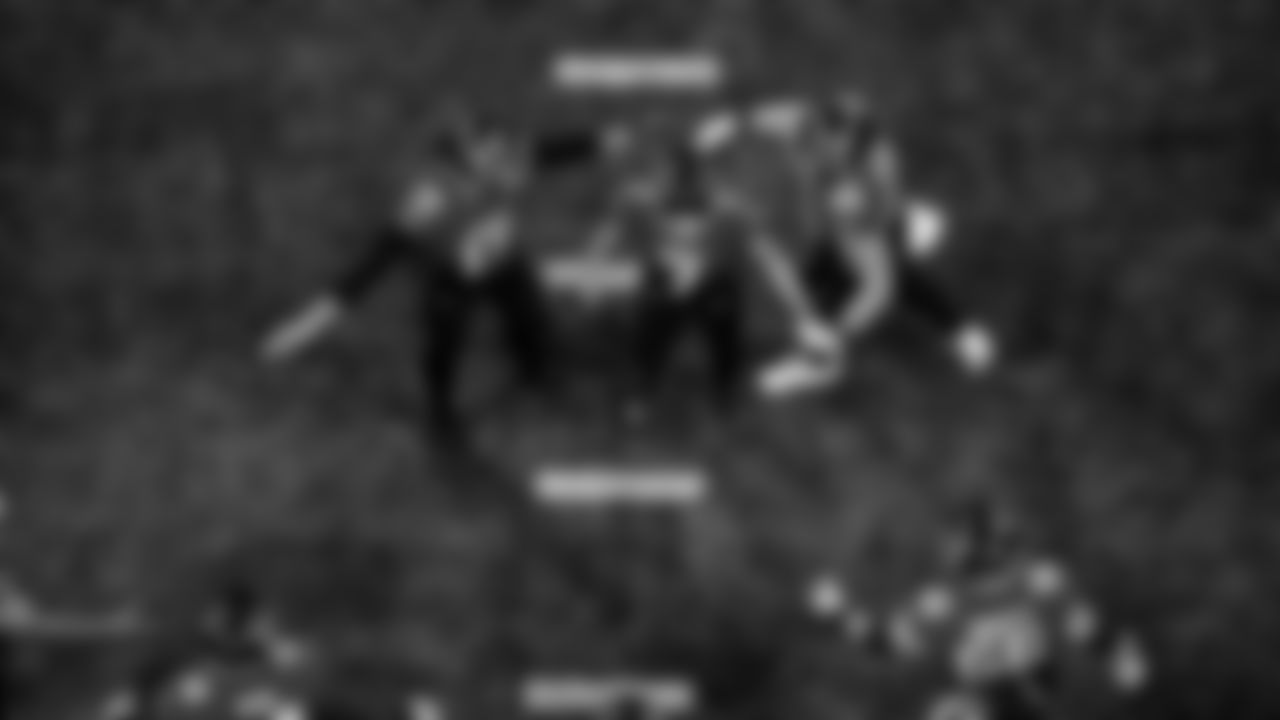ATLANTA -- Justin Fields finished Sunday's game in Atlanta with 85 rushing yards, averaging 4.7 yards a carry. In most circumstances, that's quite the stat line. However, when considering a couple key factors, that total actually looks really productive for the Falcons defense.
For starters, Fields was on an absolute tear coming into Sunday's 27-24 Atlanta win. In the last two weeks, Fields ran for 178 yards against Miami, only to keep his rushing total in the triple digits a week later against Detroit, too, finishing that game with 147 rushing yards.
RELATED CONTENT:
There was no question how the Bears were going to attack the Falcons, a team that just gave up 232 rushing yards against Carolina last week. According to Arthur Smith after the game, the defensive game plan was to make the Bears "earn" their rushing yards.
"It's a real credit to our defensive staff, and our defense to execute that plan," Smith said. "We knew what they were going to try to do. They were going to hit a couple, but we were going to make them earn it the long, hard way."
"We weren't going to sit there and hand them things. Our guys really executed the plan well, tackled well, were physical and got to the quarterback."

By the end of the game, the Falcons had sacked Fields four times, and dropped the Bears for a loss nine times in comparison to Chicago's three.
The game plan was obvious: The Falcons were not going to let Fields beat them.
"Shut him down and let everyone else make the plays," Abdullah Anderson said.
And that's what the defense did after preaching patience and discipline all week long in preparation to face Fields on Sunday.
"Being disciplined was probably the No. 1 thing on our list, staying in your gaps. How you rush (Fields), too. You don't want to get too high up the field because you know he's going to pump-fake you, he's going to go this way, go that way. So, staying disciplined in the rush was our biggest emphasis," Anderson said. "I am glad we executed that this week."
And why was he so glad? Because after the loss to Carolina, Anderson said plainly: "We needed this one."
"I think we took last week real personal, especially on the defensive front," he said. "It's not the performance we want, and we had to look at ourselves in the mirror and say look, 'We want to stop the run. This is the No. 1 rushing offense in the league.' We made that the emphasis. To say that we didn't play how we wanted to play last week, let's step it up this week."

What's interesting about this defensive performance, though, is that when partnered together with specific context of the last two years, it's a performance that actually shows a particular evolution for this defensive line.
At this point in 2021, defensive coordinator Dean Pees had already spoken a few times on the Falcons need to keep quarterbacks in check and in the pocket. Too many times last year did a quarterback burn this defense on the move, extending plays and picking up first downs via his legs.
And it wasn't necessarily their rushing totals that stung, it was their average per carry. Against Jalen Hurts in Week 1, he averaged 8.9 yards on seven carries. Taylor Heinicke in Week 4? An average of 8.6 yards on five carries. Josh Allen in the second-to-last game of the season? 5.4 yards a carry on 15 attempts.
With Fields in town, this was really the first time the Falcons defensive line could test its progress against a quarterback that isn't afraid to tuck it and run. Tom Brady, Matthew Stafford and Joe Burrow all have their elite status for a reason, but they're not what anyone would consider mobile when the pocket collapses. Facing Fields was the defensive line's chance to show it had evolved.
Even though Fields still accumulated 85 rushing yards, his average was kept at a mark of 4.7 yards a carry. In the last two weeks combined, that number was well over 11 yards a carry. More so, Fields hasn't been held to a less than five yards per carry average since Week 2 against Green Bay.
And this defensive line did this pieced together in a way that looks very different than what anyone originally planned it to look before the 2022 season began.
Truly, think about it: If this is May, no one has Anderson, Jalen Dalton and Timothy Horne on their radar. The Falcons had Grady Jarrett and Ta'Quon Graham. They were bringing back Anthony Rush and Marlon Davidson. They had signed Vincent Taylor.
Slowly but surely, though, the Falcons defensive line depth shrunk.
The Falcons lost Taylor well before the season began to injury. They parted ways with Rush and Davidson during the season. And slowly but surely, guys like Anderson, Dalton and Horne began getting more and more reps in games. On Sunday, that depth was tested as Graham was carted off with a knee injury. He did not return.
In his place, rotated those three players, who at one point or another were considered on the bubble of being cut or were actually practice squad elevations. Sunday's game was a testament to not only an evolving defensive line, but the depth this coaching staff and front office has accrued within the defensive interior.
"They've found players from everywhere," Smith said of the Falcons front office. "... And part of our job as coaches is to be on the same page and develop guys, because it's going to naturally happen in the NFL."
Well, it's a regression that's been happened in Atlanta since the start of the season. But if this pieced together group continue to play like they did in the win against the Bears on Sunday? Holding the league's best rushing offense to 160 rushing yards (which hasn't been below 200 in five weeks)?
It shows this evolution is heading in the right direction.
"Guys running, a defensive line that's hunting, even though we were tired we were rolling in," Grady Jarrett concluded. "It was a team effort, a group effort. I couldn't much prouder of how these guys played today and didn't quit."
Get an inside look at the matchup between the Atlanta Falcons and the Chicago Bears during Week 11.

Atlanta Falcons cornerback Darren Hall #34 warms up before the game against the Chicago Bears at Mercedes-Benz Stadium in Atlanta, Georgia on Sunday, November 20, 2022. (Photo by Casey Sykes/Atlanta Falcons)

Atlanta Falcons running back Cordarrelle Patterson #84 warms up prior to the game against the Chicago Bears at Mercedes-Benz Stadium in Atlanta, Georgia on Sunday, November 20, 2022. (Photo by Shanna Lockwood/Atlanta Falcons)

Atlanta Falcons cornerback A.J. Terrell #24 warms up before the game against the Chicago Bears at Mercedes-Benz Stadium in Atlanta, Georgia on Sunday, November 20, 2022. (Photo by Casey Sykes/Atlanta Falcons)

Atlanta Falcons players prepare to take the field prior to the game against the Chicago Bears at Mercedes-Benz Stadium in Atlanta, Georgia on Sunday, November 20, 2022. (Photo by Shanna Lockwood/Atlanta Falcons)

Atlanta Falcons kicker Younghoe Koo #7 warms up prior to the game against the Chicago Bears at Mercedes-Benz Stadium in Atlanta, Georgia on Sunday, November 20, 2022. (Photo by Shanna Lockwood/Atlanta Falcons)

Atlanta Falcons kicker Younghoe Koo #7 warms up prior to the game against the Chicago Bears at Mercedes-Benz Stadium in Atlanta, Georgia on Sunday, November 20, 2022. (Photo by Brandon Magnus/Atlanta Falcons)

Fans pose for a photo before the Dirty Birds Nest March before the game against the Chicago Bears at Mercedes-Benz Stadium in Atlanta, Georgia on Sunday, November 20, 2022. (Photo by Karl Moore/Atlanta Falcons)

Detail view of the cleats of Atlanta Falcons running back Cordarrelle Patterson #84 prior to the game against the Chicago Bears at Mercedes-Benz Stadium in Atlanta, Georgia on Sunday, November 20, 2022. (Photo by Shanna Lockwood/Atlanta Falcons)

Atlanta Falcons tight end MyCole Pruitt #85 warms up prior to the game against the Chicago Bears at Mercedes-Benz Stadium in Atlanta, Georgia on Sunday, November 20, 2022. (Photo by Kathryn Skeean/Atlanta Falcons)

Atlanta Falcons tight end Kyle Pitts #8 warms up prior to the game against the Chicago Bears at Mercedes-Benz Stadium in Atlanta, Georgia on Sunday, November 20, 2022. (Photo by Kathryn Skeean/Atlanta Falcons)

Atlanta Falcons huddle in the tunnel before the game against the Chicago Bears at Mercedes-Benz Stadium in Atlanta, Georgia on Sunday, November 20, 2022. (Photo by Mitchell Martin/Atlanta Falcons)

Atlanta Falcons quarterback Marcus Mariota #1 leads the player huddle before the game against the Chicago Bears at Mercedes-Benz Stadium in Atlanta, Georgia on Sunday, November 20, 2022. (Photo by Mitchell Martin/Atlanta Falcons)

Atlanta Falcons quarterback Marcus Mariota #1 warms up before the game against the Chicago Bears at Mercedes-Benz Stadium in Atlanta, Georgia on Sunday, November 20, 2022. (Photo by Casey Sykes/Atlanta Falcons)

Atlanta Falcons cornerback Dee Alford #37 warms up before the game against the Chicago Bears at Mercedes-Benz Stadium in Atlanta, Georgia on Sunday, November 20, 2022. (Photo by Mitchell Martin/Atlanta Falcons)

Atlanta Falcons wide receiver Drake London #5 warms up before the game against the Chicago Bears at Mercedes-Benz Stadium in Atlanta, Georgia on Sunday, November 20, 2022. (Photo by Casey Sykes/Atlanta Falcons)

Atlanta Falcons defensive lineman Grady Jarrett #97 walks out to warmups before the game against the Chicago Bears at Mercedes-Benz Stadium in Atlanta, Georgia on Sunday, November 20, 2022. (Photo by Mitchell Martin/Atlanta Falcons)

Atlanta Falcons offensive lineman Colby Gossett #66 and Atlanta Falcons defensive end Amani Bledsoe #94 warm up before the game against the Chicago Bears at Mercedes-Benz Stadium in Atlanta, Georgia on Sunday, November 20, 2022. (Photo by Mitchell Martin/Atlanta Falcons)

Atlanta Falcons cornerback Dee Alford #37 warms up before the game against the Chicago Bears at Mercedes-Benz Stadium in Atlanta, Georgia on Sunday, November 20, 2022. (Photo by Casey Sykes/Atlanta Falcons)

Atlanta Falcons running back Avery Williams #35 warms up before the game against the Chicago Bears at Mercedes-Benz Stadium in Atlanta, Georgia on Sunday, November 20, 2022. (Photo by Casey Sykes/Atlanta Falcons)

Atlanta Falcons offensive lineman Jake Matthews #70 walks out onto the field for warmups before the game against the Chicago Bears at Mercedes-Benz Stadium in Atlanta, Georgia on Sunday, November 20, 2022. (Photo by Mitchell Martin/Atlanta Falcons)

Atlanta Falcons tight end Kyle Pitts #8 warms up before the game against the Chicago Bears at Mercedes-Benz Stadium in Atlanta, Georgia on Sunday, November 20, 2022. (Photo by Casey Sykes/Atlanta Falcons)

Atlanta Falcons outside linebacker Lorenzo Carter #9 looks on before the game against the Chicago Bears at Mercedes-Benz Stadium in Atlanta, Georgia on Sunday, November 20, 2022. (Photo by Casey Sykes/Atlanta Falcons)

Atlanta Falcons cornerback Mike Ford #28 warms up prior to the game against the Chicago Bears at Mercedes-Benz Stadium in Atlanta, Georgia on Sunday, November 20, 2022. (Photo by Shanna Lockwood/Atlanta Falcons)

Atlanta Falcons fullback Keith Smith #40 warms up prior to the game against the Chicago Bears at Mercedes-Benz Stadium in Atlanta, Georgia on Sunday, November 20, 2022. (Photo by Shanna Lockwood/Atlanta Falcons)

Atlanta Falcons tackle Kaleb McGary #76 walks out of the locker room before the game against the Chicago Bears at Mercedes-Benz Stadium in Atlanta, Georgia on Sunday, November 20, 2022. (Photo by Mitchell Martin/Atlanta Falcons)

Atlanta Falcons inside linebacker Troy Andersen #44 and Atlanta Falcons inside linebacker Nick Kwiatkoski #53 walk out of the locker room before the game against the Chicago Bears at Mercedes-Benz Stadium in Atlanta, Georgia on Sunday, November 20, 2022. (Photo by Mitchell Martin/Atlanta Falcons)

Atlanta Falcons players prepare to take the field prior to the game against the Chicago Bears at Mercedes-Benz Stadium in Atlanta, Georgia on Sunday, November 20, 2022. (Photo by Shanna Lockwood/Atlanta Falcons)

Atlanta Falcons cornerback A.J. Terrell #24 looks on during the National Anthem before the game against the Chicago Bears at Mercedes-Benz Stadium in Atlanta, Georgia on Sunday, November 20, 2022. (Photo by Mitchell Martin/Atlanta Falcons)

Atlanta Falcons defensive lineman Grady Jarrett #97 looks on during the National Anthem before the game against the Chicago Bears at Mercedes-Benz Stadium in Atlanta, Georgia on Sunday, November 20, 2022. (Photo by Mitchell Martin/Atlanta Falcons)

Atlanta Falcons punter Bradley Pinion #13 warms up prior to the game against the Chicago Bears at Mercedes-Benz Stadium in Atlanta, Georgia on Sunday, November 20, 2022. (Photo by Shanna Lockwood/Atlanta Falcons)

The Atlanta Falcons walk out for the coin toss before the game against the Chicago Bears at Mercedes-Benz Stadium in Atlanta, Georgia on Sunday, November 20, 2022. (Photo by Mitchell Martin/Atlanta Falcons)

Atlanta Falcons quarterback Marcus Mariota #1 warms up prior to the game against the Chicago Bears at Mercedes-Benz Stadium in Atlanta, Georgia on Sunday, November 20, 2022. (Photo by Brandon Magnus/Atlanta Falcons)

Atlanta Falcons tight end Kyle Pitts #8 warms up prior to the game against the Chicago Bears at Mercedes-Benz Stadium in Atlanta, Georgia on Sunday, November 20, 2022. (Photo by Brandon Magnus/Atlanta Falcons)

Atlanta Falcons wide receiver KhaDarel Hodge #12 carries the ball during the game against the Chicago Bears at Mercedes-Benz Stadium in Atlanta, Georgia on Sunday, November 20, 2022. (Photo by Mitchell Martin/Atlanta Falcons)

Atlanta Falcons running back Cordarrelle Patterson #84 carries the ball during the game against the Chicago Bears at Mercedes-Benz Stadium in Atlanta, Georgia on Sunday, November 20, 2022. (Photo by Mitchell Martin/Atlanta Falcons)

Atlanta Falcons running back Cordarrelle Patterson #84 rushes during the first quarter against the Chicago Bears at Mercedes-Benz Stadium in Atlanta, Georgia on Sunday, November 20, 2022. (Photo by Brandon Magnus/Atlanta Falcons)

Atlanta Falcons quarterback Marcus Mariota #1 calls out the play before the snap during the game against the Chicago Bears at Mercedes-Benz Stadium in Atlanta, Georgia on Sunday, November 20, 2022. (Photo by Mitchell Martin/Atlanta Falcons)

Atlanta Falcons wide receiver Drake London #5 catches a touchdown pass during the first quarter against the Chicago Bears at Mercedes-Benz Stadium in Atlanta, Georgia on Sunday, November 20, 2022. (Photo by Shanna Lockwood/Atlanta Falcons)

Atlanta Falcons wide receiver Drake London #5 celebrates after scoring a touchdown during the first quarter against the Chicago Bears at Mercedes-Benz Stadium in Atlanta, Georgia on Sunday, November 20, 2022. (Photo by Shanna Lockwood/Atlanta Falcons)

Atlanta Falcons wide receiver Drake London #5 celebrates after scoring a touchdown during the first quarter against the Chicago Bears at Mercedes-Benz Stadium in Atlanta, Georgia on Sunday, November 20, 2022. (Photo by Brandon Magnus/Atlanta Falcons)

Atlanta Falcons wide receiver Drake London #5 celebrates after scoring a touchdown during the first quarter against the Chicago Bears at Mercedes-Benz Stadium in Atlanta, Georgia on Sunday, November 20, 2022. (Photo by Shanna Lockwood/Atlanta Falcons)

Atlanta Falcons wide receiver Drake London #5 celebrates after scoring a touchdown during the first quarter against the Chicago Bears at Mercedes-Benz Stadium in Atlanta, Georgia on Sunday, November 20, 2022. (Photo by Shanna Lockwood/Atlanta Falcons)

Atlanta Falcons wide receiver Olamide Zaccheaus #17 is tackled during the first quarter against the Chicago Bears at Mercedes-Benz Stadium in Atlanta, Georgia on Sunday, November 20, 2022. (Photo by Brandon Magnus/Atlanta Falcons)

Atlanta Falcons tight end Kyle Pitts #8 is seen during the first quarter against the Chicago Bears at Mercedes-Benz Stadium in Atlanta, Georgia on Sunday, November 20, 2022. (Photo by Shanna Lockwood/Atlanta Falcons)

Atlanta Falcons tight end Kyle Pitts #8 runs with the ball during the first quarter against the Chicago Bears at Mercedes-Benz Stadium in Atlanta, Georgia on Sunday, November 20, 2022. (Photo by Shanna Lockwood/Atlanta Falcons)

Atlanta Falcons quarterback Marcus Mariota #1 looks to pass during the first quarter against the Chicago Bears at Mercedes-Benz Stadium in Atlanta, Georgia on Sunday, November 20, 2022. (Photo by Kathryn Skeean/Atlanta Falcons)

Atlanta Falcons tight end Kyle Pitts #8 runs after a catch during the first quarter against the Chicago Bears at Mercedes-Benz Stadium in Atlanta, Georgia on Sunday, November 20, 2022. (Photo by Kathryn Skeean/Atlanta Falcons)

Atlanta Falcons quarterback Marcus Mariota #1 passes the ball to Atlanta Falcons running back Cordarrelle Patterson #84 during the game against the Chicago Bears at Mercedes-Benz Stadium in Atlanta, Georgia on Sunday, November 20, 2022. (Photo by Casey Sykes/Atlanta Falcons)

Former Falcon Keith Brooking signs autographs for fans during the game against the Chicago Bears at Mercedes-Benz Stadium in Atlanta, Georgia on Sunday, November 20, 2022. (Photo by Karl Moore/Atlanta Falcons)

Atlanta Falcons quarterback Marcus Mariota #1 huddles the offense during the first quarter against the Chicago Bears at Mercedes-Benz Stadium in Atlanta, Georgia on Sunday, November 20, 2022. (Photo by Brandon Magnus/Atlanta Falcons)

Atlanta Falcons outside linebacker Lorenzo Carter #9 and Atlanta Falcons inside linebacker Rashaan Evans #54 set up before a play during the game against the Chicago Bears at Mercedes-Benz Stadium in Atlanta, Georgia on Sunday, November 20, 2022. (Photo by Mitchell Martin/Atlanta Falcons)

Atlanta Falcons quarterback Marcus Mariota #1 carries the ball during the game against the Chicago Bears at Mercedes-Benz Stadium in Atlanta, Georgia on Sunday, November 20, 2022. (Photo by Casey Sykes/Atlanta Falcons)

Atlanta Falcons defensive lineman Grady Jarrett #97 sacks the quarterback during the game against the Chicago Bears at Mercedes-Benz Stadium in Atlanta, Georgia on Sunday, November 20, 2022. (Photo by Mitchell Martin/Atlanta Falcons)

Atlanta Falcons defensive lineman Grady Jarrett #97 reacts after a sack during the game against the Chicago Bears at Mercedes-Benz Stadium in Atlanta, Georgia on Sunday, November 20, 2022. (Photo by Mitchell Martin/Atlanta Falcons)

Atlanta Falcons defensive lineman Grady Jarrett #97 reacts after a sack during the game against the Chicago Bears at Mercedes-Benz Stadium in Atlanta, Georgia on Sunday, November 20, 2022. (Photo by Mitchell Martin/Atlanta Falcons)

Atlanta Falcons running back Cordarrelle Patterson #84 runs for a return kick touchdown during the game against the Chicago Bears at Mercedes-Benz Stadium in Atlanta, Georgia on Sunday, November 20, 2022. (Photo by Mitchell Martin/Atlanta Falcons)

Atlanta Falcons running back Cordarrelle Patterson #84 returns a kick for a touchdown during the second quarter against the Chicago Bears at Mercedes-Benz Stadium in Atlanta, Georgia on Sunday, November 20, 2022. (Photo by Shanna Lockwood/Atlanta Falcons)

Atlanta Falcons running back Cordarrelle Patterson #84 rushes during the second quarter against the Chicago Bears at Mercedes-Benz Stadium in Atlanta, Georgia on Sunday, November 20, 2022. (Photo by Kathryn Skeean/Atlanta Falcons)

Atlanta Falcons running back Cordarrelle Patterson #84 scores a touchdown during the kick return to break the NFL record during the game against the Chicago Bears at Mercedes-Benz Stadium in Atlanta, Georgia on Sunday, November 20, 2022. (Photo by Mitchell Martin/Atlanta Falcons)

Atlanta Falcons running back Cordarrelle Patterson #84 runs for a return kick touchdown during the game against the Chicago Bears at Mercedes-Benz Stadium in Atlanta, Georgia on Sunday, November 20, 2022. (Photo by Mitchell Martin/Atlanta Falcons)

General view from the roof after a touchdown by Atlanta Falcons running back Cordarrelle Patterson #84 during the second quarter against the Chicago Bears at Mercedes-Benz Stadium in Atlanta, Georgia on Sunday, November 20, 2022. (Photo by Brandon Magnus/Atlanta Falcons)

Atlanta Falcons running back Cordarrelle Patterson #84 celebrates after scoring a touchdown during the second quarter against the Chicago Bears at Mercedes-Benz Stadium in Atlanta, Georgia on Sunday, November 20, 2022. (Photo by Shanna Lockwood/Atlanta Falcons)

The Atlanta Falcons celebrate after Atlanta Falcons running back Cordarrelle Patterson #84 scores a touchdown on a kick return to break the NFL record during the game against the Chicago Bears at Mercedes-Benz Stadium in Atlanta, Georgia on Sunday, November 20, 2022. (Photo by Mitchell Martin/Atlanta Falcons)

Atlanta Falcons defense attempts to block a field goal during the first half against the Chicago Bears at Mercedes-Benz Stadium in Atlanta, Georgia on Sunday, November 20, 2022. (Photo by Kathryn Skeean/Atlanta Falcons)

Atlanta Falcons cornerback Mike Ford #28 and Atlanta Falcons inside linebacker Rashaan Evans #54 react after a play during the game against the Chicago Bears at Mercedes-Benz Stadium in Atlanta, Georgia on Sunday, November 20, 2022. (Photo by Mitchell Martin/Atlanta Falcons)

Atlanta Falcons tight end Kyle Pitts #8 runs after a catch during the first half against the Chicago Bears at Mercedes-Benz Stadium in Atlanta, Georgia on Sunday, November 20, 2022. (Photo by Shanna Lockwood/Atlanta Falcons)

Atlanta Falcons inside linebacker Mykal Walker #3 sets up before a play during the game against the Chicago Bears at Mercedes-Benz Stadium in Atlanta, Georgia on Sunday, November 20, 2022. (Photo by Mitchell Martin/Atlanta Falcons)

Atlanta Falcons wide receiver Damiere Byrd #14 carries the ball during the game against the Chicago Bears at Mercedes-Benz Stadium in Atlanta, Georgia on Sunday, November 20, 2022. (Photo by Mitchell Martin/Atlanta Falcons)

Atlanta Falcons kicker Younghoe Koo #7 lines up for a field goal attempt during the first half against the Chicago Bears at Mercedes-Benz Stadium in Atlanta, Georgia on Sunday, November 20, 2022. (Photo by Shanna Lockwood/Atlanta Falcons)

Atlanta Falcons long snapper Liam McCullough #48 blocks on a field goal attempt during the first half against the Chicago Bears at Mercedes-Benz Stadium in Atlanta, Georgia on Sunday, November 20, 2022. (Photo by Shanna Lockwood/Atlanta Falcons)

Atlanta Falcons kicker Younghoe Koo #7 scores a field goal during the game against the Chicago Bears at Mercedes-Benz Stadium in Atlanta, Georgia on Sunday, November 20, 2022. (Photo by Mitchell Martin/Atlanta Falcons)

Atlanta Falcons tight end Kyle Pitts #8 carries the ball during the game against the Chicago Bears at Mercedes-Benz Stadium in Atlanta, Georgia on Sunday, November 20, 2022. (Photo by Mitchell Martin/Atlanta Falcons)

Atlanta Falcons offensive lineman Drew Dalman #67 prepares to snap the ball during the first half against the Chicago Bears at Mercedes-Benz Stadium in Atlanta, Georgia on Sunday, November 20, 2022. (Photo by Shanna Lockwood/Atlanta Falcons)

Atlanta Falcons inside linebacker Rashaan Evans #54 reacts after a play during the second half against the Chicago Bears at Mercedes-Benz Stadium in Atlanta, Georgia on Sunday, November 20, 2022. (Photo by Shanna Lockwood/Atlanta Falcons)

Atlanta Falcons outside linebacker Arnold Ebiketie #47 lines up during the second half against the Chicago Bears at Mercedes-Benz Stadium in Atlanta, Georgia on Sunday, November 20, 2022. (Photo by Shanna Lockwood/Atlanta Falcons)

Atlanta Falcons outside linebacker Arnold Ebiketie #47 makes a tackle during the second half against the Chicago Bears at Mercedes-Benz Stadium in Atlanta, Georgia on Sunday, November 20, 2022. (Photo by Shanna Lockwood/Atlanta Falcons)

Atlanta Falcons outside linebacker Lorenzo Carter #9 makes a tackle during the game against the Chicago Bears at Mercedes-Benz Stadium in Atlanta, Georgia on Sunday, November 20, 2022. (Photo by Casey Sykes/Atlanta Falcons)

Atlanta Falcons defensive lineman Grady Jarrett #97 reacts during the game against the Chicago Bears at Mercedes-Benz Stadium in Atlanta, Georgia on Sunday, November 20, 2022. (Photo by Casey Sykes/Atlanta Falcons)

Atlanta Falcons fullback Keith Smith #40, safety Erik Harris #23, and safety Jaylinn Hawkins #32 line up during the second half against the Chicago Bears at Mercedes-Benz Stadium in Atlanta, Georgia on Sunday, November 20, 2022. (Photo by Shanna Lockwood/Atlanta Falcons)

Atlanta Falcons quarterback Marcus Mariota #1 carries the ball for a touchdown during the game against the Chicago Bears at Mercedes-Benz Stadium in Atlanta, Georgia on Sunday, November 20, 2022. (Photo by Casey Sykes/Atlanta Falcons)

Atlanta Falcons quarterback Marcus Mariota #1 carries the ball for a touchdown during the game against the Chicago Bears at Mercedes-Benz Stadium in Atlanta, Georgia on Sunday, November 20, 2022. (Photo by Casey Sykes/Atlanta Falcons)

Atlanta Falcons quarterback Marcus Mariota #1 rushes for a touchdown during the second half against the Chicago Bears at Mercedes-Benz Stadium in Atlanta, Georgia on Sunday, November 20, 2022. (Photo by Shanna Lockwood/Atlanta Falcons)

Atlanta Falcons quarterback Marcus Mariota #1 carries the ball to score a touchdown during the game against the Chicago Bears at Mercedes-Benz Stadium in Atlanta, Georgia on Sunday, November 20, 2022. (Photo by Mitchell Martin/Atlanta Falcons)

Atlanta Falcons quarterback Marcus Mariota #1 rushes for a touchdown during the second half against the Chicago Bears at Mercedes-Benz Stadium in Atlanta, Georgia on Sunday, November 20, 2022. (Photo by Shanna Lockwood/Atlanta Falcons)

Atlanta Falcons wide receiver Olamide Zaccheaus #17 runs during the second half against the Chicago Bears at Mercedes-Benz Stadium in Atlanta, Georgia on Sunday, November 20, 2022. (Photo by Shanna Lockwood/Atlanta Falcons)

General view from the roof during the first half against the Chicago Bears at Mercedes-Benz Stadium in Atlanta, Georgia on Sunday, November 20, 2022. (Photo by Brandon Magnus/Atlanta Falcons)

Atlanta Falcons inside linebacker Rashaan Evans #54 lines up during the second half against the Chicago Bears at Mercedes-Benz Stadium in Atlanta, Georgia on Sunday, November 20, 2022. (Photo by Shanna Lockwood/Atlanta Falcons)

Atlanta Falcons kicker Younghoe Koo #7 kicks a point after try during the second half against the Chicago Bears at Mercedes-Benz Stadium in Atlanta, Georgia on Sunday, November 20, 2022. (Photo by Brandon Magnus/Atlanta Falcons)

Atlanta Falcons kicker Younghoe Koo #7 reacts after kicking a point after try during the first half against the Chicago Bears at Mercedes-Benz Stadium in Atlanta, Georgia on Sunday, November 20, 2022. (Photo by Brandon Magnus/Atlanta Falcons)

Atlanta Falcons cornerback Isaiah Oliver #26 makes a tackle during the second half against the Chicago Bears at Mercedes-Benz Stadium in Atlanta, Georgia on Sunday, November 20, 2022. (Photo by Shanna Lockwood/Atlanta Falcons)

An overall view of the stadium after the win against the Chicago Bears at Mercedes-Benz Stadium in Atlanta, Georgia on Sunday, November 20, 2022. (Photo by Karl Moore/Atlanta Falcons)

Atlanta Falcons head coach Arthur Smith shakes hands with the Chicago Bears Head Coach after the game against the Chicago Bears at Mercedes-Benz Stadium in Atlanta, Georgia on Sunday, November 20, 2022. (Photo by Casey Sykes/Atlanta Falcons)

Atlanta Falcons cornerback Darren Hall #34 poses for a photo with Chicago Bears player #33 after the game against the Chicago Bears at Mercedes-Benz Stadium in Atlanta, Georgia on Sunday, November 20, 2022. (Photo by Mitchell Martin/Atlanta Falcons)

Atlanta Falcons kicker Younghoe Koo #7 signs his jersey for the jersey swap after the game against the Chicago Bears at Mercedes-Benz Stadium in Atlanta, Georgia on Sunday, November 20, 2022. (Photo by Mitchell Martin/Atlanta Falcons)

Atlanta Falcons fullback Keith Smith #40 reacts after the game against the Chicago Bears at Mercedes-Benz Stadium in Atlanta, Georgia on Sunday, November 20, 2022. (Photo by Mitchell Martin/Atlanta Falcons)

Atlanta Falcons running back Cordarrelle Patterson #84 reacts after the game against the Chicago Bears at Mercedes-Benz Stadium in Atlanta, Georgia on Sunday, November 20, 2022. (Photo by Mitchell Martin/Atlanta Falcons)

Atlanta Falcons running back Tyler Allgeier #25 reacts after the game against the Chicago Bears at Mercedes-Benz Stadium in Atlanta, Georgia on Sunday, November 20, 2022. (Photo by Mitchell Martin/Atlanta Falcons)

Atlanta Falcons wide receiver Frank Darby #88 reacts after the game against the Chicago Bears at Mercedes-Benz Stadium in Atlanta, Georgia on Sunday, November 20, 2022. (Photo by Mitchell Martin/Atlanta Falcons)

Atlanta Falcons guard Chris Lindstrom #63 fist bumps with Atlanta Falcons outside linebacker Adetokunbo Ogundeji #92 after the game against the Chicago Bears at Mercedes-Benz Stadium in Atlanta, Georgia on Sunday, November 20, 2022. (Photo by Mitchell Martin/Atlanta Falcons)















